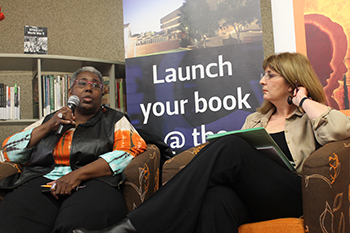Latest News Archive
Please select Category, Year, and then Month to display items
11 February 2022
|
Story Leonie Bolleurs and Rulanzen Martin
![]()

After two years of lockdown, online meetings, and limited contact with colleagues, academy at the University of the Free State (UFS) is gradually returning to normal. This month (February 2022), staff, students, and members of related industries will convene on three different occasions to learn about cutting-edge scholarship, to reconnect with each other, and to discuss issues impacting society in the fields of theology, the humanities, and agriculture.
Seminar on ‘The Limits of Decolonisation’ with Prof RW Johnson
Date: 24 February 2022
Time: 09:00-16:00 SAST
Venue/Platform: Equitas Auditorium, UFS Bloemfontein Campus, and Microsoft Teams
Decolonisation has been a heated point of discussion for some time now, but have you ever wondered if there could be limitations hindering the decolonisation project? The Departments of Political Studies and Governance and Philosophy and Classics at the UFS will host an array of academics and experts for a hybrid seminar on the topic The Limits of Decolonisation.
If decolonisation is an important issue for you or if you are interested in the topic and its relevance and influence in the world and academia, you should join or attend the seminar – either online via Microsoft Teams or in person in the Equitas Auditorium – on 24 February 2022 from 09:00.
The keynote speaker is political scientist
Prof RW Johnson from the University of Oxford. Prof Johnson is an emeritus fellow at Magdalen College and is the author of several acclaimed political books. The other speakers are all from the Departments of Political Studies and Governance, and Philosophy and Classics. Terrence Corrigan from the
South African Institute of Race Relations will speak on The relationship between critical race theory and decolonisation.
RSVP: Alice Stander StanderAFM@ufs.ac.za (please specify dietary requirements, as a light lunch will be served)

Africa’s lost voice during the Second World War echoes throughout book
2016-08-24

Prof Judith Byfield and Prof Heidi Hudson at the
book launch of Africa and Second World War at the
UFS Sasol Library.
Photo: Rulanzen Martin
If you pick up any historical record on the Second World War, you would see that, to a large extent, Africa has been missing from the history pages until now.
Africa and the Second World War (WW II) is a book edited by Prof Carolyn Brown from Rutgers University and Prof Judith Byfield from Cornell University in the United States. The book is the outcome of various papers presented during a workshop at Rutgers University and at a conference on WWII hosted at Cornell University.
The co-editors of the book were invited by Prof Jonathan Jansen, Vice-Chancellor and Rector of the University of the Free State (UFS), to launch the book at the UFS. The Centre for Africa Studies at the university, in collaboration with the UFS Sasol Library, presented the launch on Tuesday 16 August 2016.
Bestowing honour upon Africa’s role during WW II
Many people do not know that WW II started in Ethiopia with the Italian Invasion. This is generally omitted from discussions or complete histories of WW II. The present book explores the experiences of male and female combatants, peasant producers, women traders, missionaries, and sex workers during the war. “Many people are not aware that Africa produced most of the mineral and agricultural during the war,” said Prof Brown.
Book to reach a greater audience for discussion
The co-editors hope that the book reaches people who teach WW II history, as many talk about only the nationalist movements. “The opening of the book also talks about the importance of South Africa during WW II,” said Prof Byfield. The authors hope that people will read the book to start thinking comparatively about the war.